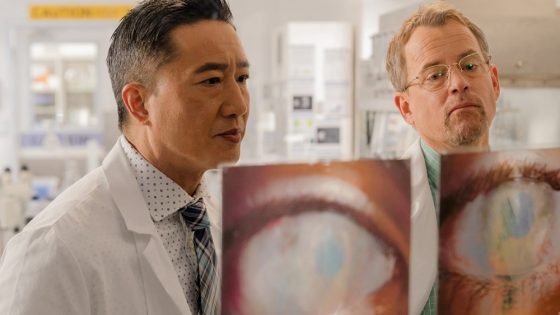Call “Sight” a stealth faith-based movie and you won’t be far off the mark. For the most part, it’s a respectful but unremarkable biopic about Dr. Ming Wang, a Chinese-born, Nashville-based eye surgeon whose innovative use of amniotic membrane contact lenses has helped restore the eyesight of millions of patients, many of them children. But the end, which contains a QR code much like distributor Angel Studios’ summer blockbuster “Sound of Freedom” did last year, features the real Dr. Wang — one of the film’s executive producers — in a sequence where he credits his success as having been possible “only with God’s grace,” after he was able to “open myself to God.”
Judging from the time-tripping scenario cobbled together by writers John Duigan, Buzz McLaughlin and director Andrew Hyatt, Wang’s road to Damascus was a rugged one. The decades-spanning story covers his traumatic childhood in Hangzhou, China during the 1970s Cultural Revolution, when his medically trained parents and dear friend Lili (Sara Lee) were routinely roughed up by the anti-intellectual Red Guards, as well as Wang’s diligent efforts to ignore prejudice and defy patronizing expectations while attending medical school in America. Viewers watch as Wang (played by Ben Wang and Jayden Zhang in flashbacks) evolves into a relentlessly driven individual eager to make his mark — and make his parents, who join him in America, proud.
Of course, there’s never any real doubt that Wang will overcome all obstacles in his path — well, most of them, anyway — because “Sight” begins with Wang (played by Terry Chen as an adult) making medical history in 2007 when he and his Nashville clinic team complete the first laser artificial cornea implantation. Only gradually, as the movie jumps back and forth over five decades to trace what brought him to this success, do we learn why even this breakthrough and the attendant publicity won’t be enough to enable Wang to purge bad memories with contemporary triumphs. His emotional reserve is such that his associate of many years, Dr. Mischa Bartnovsky (Greg Kinnear), routinely teases him about it, as characters like Bartnovsky usually do in movies like this.
The dialogue too often ranges from ponderously flat to painfully on-the-nose — the phrase “The present is made possible by the past” is spoken twice, more than one too many times — and while there’s never any real problem following the flashback-to-flashback continuity in the narrative, the pacing is such that you may find yourself, if not bored, then less than 100 percent attentive. Rarely does Hyatt’s direction avoid the temptation to underline the obvious. The movie was shot in Canada, but just to make sure the audience thinks we’re really in Nashville, we see lots of second-unit footage of Music City, and Wang sleeps in a touristy Nashville T-shirt.
What keeps “Sight” compelling despite its flaws is the plot thread involving Kajal (Mia Swamination), a sightless Indian girl who’s brought to Nashville by a compassionate nun (Fionnula Flannagan, breathing life into a thinly written stereotype) in search of a miracle cure.
In a flashback that uncomfortably echoes “Slumdog Millionaire,” Kajal is blinded by her stepmother so the girl will appear more pitiful (and garner more donations) as a beggar on the streets of Calcutta. In present-day Nashville, Wang and Bartnovsky tirelessly research and experiment (a scene with rabbits employed as test subjects is one of the movie’s few moments of comic relief). It becomes clear fairly early — way before Wang actually announces it to Bartnovsky — that the immigrant doctor is at least partly driven by his belief that finding a cure for Kajal will somehow make amends for his inability to protect Lili, who was seized by Red Guard rebels back in Hangzhou and occasionally haunts his dreams.
For all its predictability, “Sight” has a few surprises up its sleeve, especially when Wang discovers there’s more than one way to measure success or failure. (This, it should be noted, is where the switch to faith-based storytelling begins.) The acting is generally fine, with Chen’s persuasive turn rising to the occasion when Wang’s emotions can no longer be contained. Kinnear effectively plays Bartnovsky as a close confidant who knows when to encourage his friend and when to keep his mouth shut. One of the film’s emotional peaks: Bartnovsky overhears a brutally critical remark muttered by a harried Wang, and for a flash it looks like his heart has broken into a zillion pieces. Indeed, in that moment, Kinnear almost manages to elicit more sympathy than the other, more troubled characters in “Sight.” Almost.
Source Agencies



